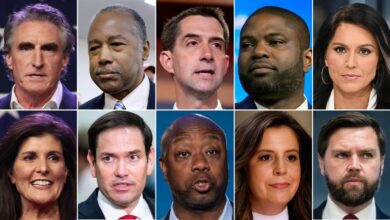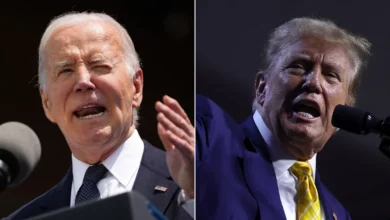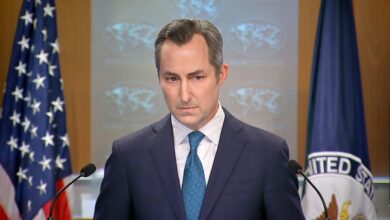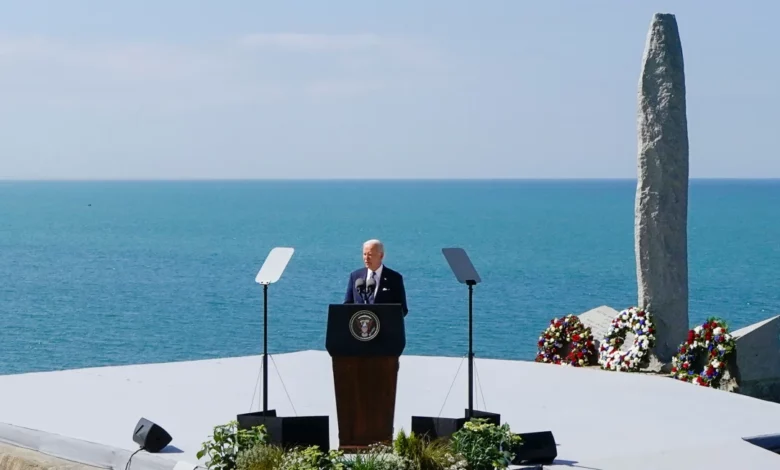
President Joe Biden on Friday summoned Americans to a defense of democracy, calling on the ideals of the Army Rangers who scaled the cliffs of Pointe du Hoc 80 years ago to warn against a drift toward authoritarianism and drawing an implicit contrast with rival Donald Trump.
Speaking from a concrete bunker where the US troops sought to dismantle German artillery, Biden said those men – none of whom are still alive today – would want their modern day fellow citizens to do their part to protect against autocrats.
“They’re not asking us to scale these cliffs,” Biden said in his 15-minute speech. “But they’re asking us to stay true to what America stands for. They’re not asking us to give or risk our lives. But they are asking us to care for others in our country more than ourselves.”
“They’re asking us to do our job, to protect freedom in our time, to defend democracy, to stand up to aggression abroad and at home to be part of something bigger than ourselves,” he went on.
The clear skies and azure Atlantic water Biden spoke in front of was a distant cry from the harrowing day he was describing in his speech. But with war once more on Western Europe’s doorstep and a rival in the United States who has vowed to act as a dictator on his first day in office should he win in November, Biden sought to use D-Day as a call to modern vigilance.
“As we gather here today, it’s not just to honor those who showed such remarkable bravery that day, June 6, 1944. It’s to listen to the echo of their voices. To hear them. Because they are summoning us,” he said.
In a week filled with poignant images featuring America’s Greatest Generation, the speech stood out as a call to modern-day action against an isolationist streak seeping into American politics and a rise of authoritarianism around the world.
Not lost on White House aides planning the speech was the one delivered on the same spot 40 years ago by Ronald Reagan, a Republican who issued warnings against isolationism in the face of tyranny.
Eighty years after the allied landings, the president drew a “throughline” from World War II to today. He didn’t mention Trump by name, but the contrast was clear.
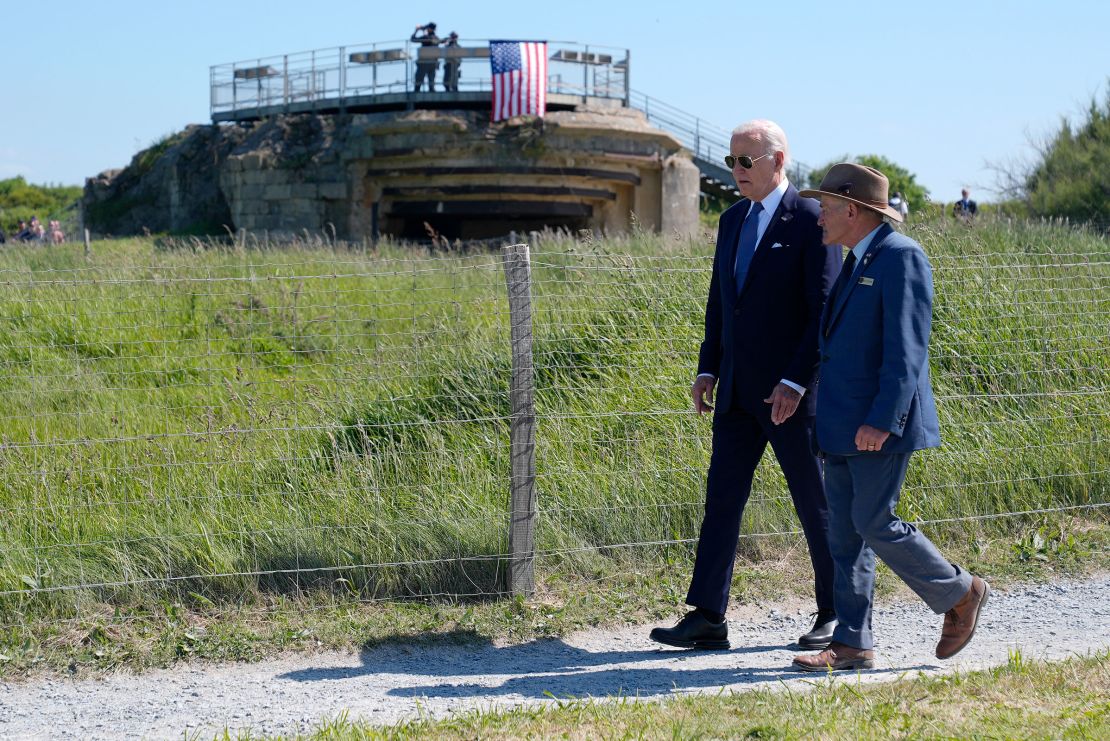
Biden has repeatedly cast Trump’s embrace of authoritarian leaders – including Russian President Vladimir Putin and North Korea’s Kim Jong Un – as a threat to democracy.
The president, Sullivan continued, will “really be drawing a throughline from World War II through the Cold War and the stand up of the greatest military alliance the world has ever known, the NATO alliance, to today, where we face once again war in Europe, where NATO has rallied to defend freedom and sovereignty in Europe.”
Biden, a senior administration official told CNN, will “focus on the veterans of World War II and what we owe them and how we have to live up to their example – and the power of democracy.”
It comes as Biden is facing duel international crises: In Ukraine, where the US is hoping to turn the tide of Russia’s offensive, and in the Middle East, where the Biden administration is calling on Hamas to accept an agreement on a ceasefire and hostage proposal.
A monthslong delay in providing additional American assistance to Ukraine, prompted in part by resistance from Republicans aligned with Trump, led to setbacks on the battlefield and momentum for Russia. The strain of isolationism has led to concerns in Europe and elsewhere about what a return by Trump to the White House might portend.
Biden announced a new aid package for Ukraine in a bilateral meeting with Ukrainian President Volodymyr Zelensky on Friday, touting the new funding for the war-torn region while apologizing for the delay.

“You know, you haven’t bowed down, you haven’t yielded at all, you continue to fight in a way that is just remarkable, is just remarkable – and we’re not going to walk away from you,” Biden told the Ukrainian president. “I apologize for the weeks of not knowing what’s going to pass, in terms of funding, because we had trouble getting the bill that we had to pass that had the money from some of our very conservative members who were holding it up, but we got it done.”
Still, he took the opportunity to tout Friday’s funding announcement, as well as the additional funding sent to Ukraine since he signed the bill in April.
“Since then, including today, I’ve announced six packages of significant funding today Including today – today I’m also signing an additional package for $225 million to reconstruct the electric grid,” he said.
By speaking at Pointe du Hoc, Biden is harkening back to one of the most famous presidential speeches ever delivered, the 40th anniversary D-Day address by Reagan.
Reagan delivered a forceful rebuke of authoritarianism framed through the lens of the bravery of “the boys of Pointe du Hoc.” The senior administration official said: “There’s no way there’s not going to be comparisons.”
That speech, like Biden’s, occurred at a moment of contention with Russia.
Flanked by the men who fought there, Reagan, another aging president running for reelection, made a forceful call for the power of democracy.
“You all knew that some things are worth dying for. One’s country is worth dying for, and democracy is worth dying for, because it’s the most deeply honorable form of government ever devised by man. All of you loved liberty. All of you were willing to fight tyranny, and you knew the people of your countries were behind you,” Reagan said.
Like Biden, he also warned about American withdrawal from the world.
“We’ve learned that isolationism never was and never will be an acceptable response to tyrannical governments,” Reagan said then.

